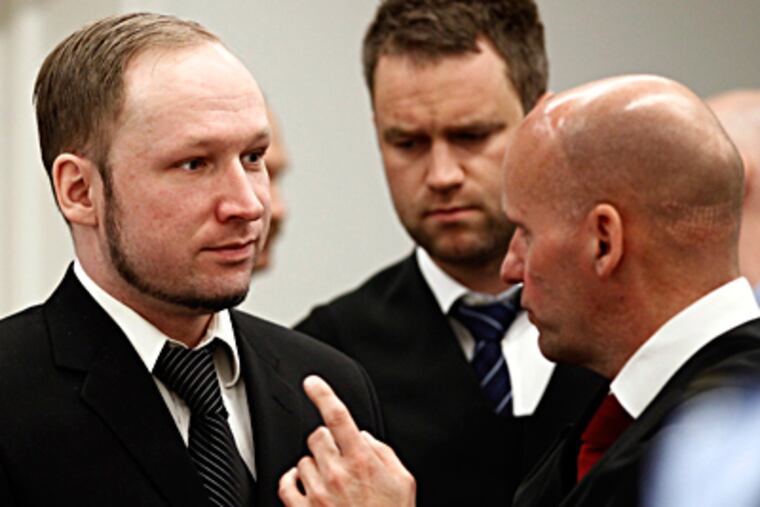To Norway extremist, it's either freedom or death
OSLO, Norway - The right-wing fanatic on trial for massacring 77 people in Norway says he wants either freedom or death, calling the country's prison terms "pathetic" and arguing for the return of capital punishment, which was last used here to execute Nazi collaborators after World War II.

OSLO, Norway - The right-wing fanatic on trial for massacring 77 people in Norway says he wants either freedom or death, calling the country's prison terms "pathetic" and arguing for the return of capital punishment, which was last used here to execute Nazi collaborators after World War II.
In the third day of his terror trial, Anders Behring Breivik was grilled by prosecutors about the anti-Muslim militant group he claims to belong to.
He rejected their suggestions that the "Knights Templar" doesn't exist, but admitted he had embellished when describing the network in a 1,500-page manifesto he published online before the bomb-and-shooting rampage on July 22.
"In principle it is not an organization in a conventional sense," he said, describing it as a leaderless network consisting of "independent cells."
Prosecutors told reporters after Wednesday's hearing that they don't believe the group is real or that the meetings Breivik claims took place in Liberia, Britain, and the Baltic countries ever happened.
The issue is of key importance in determining Breivik's sanity, and whether he's ultimately sent to prison or compulsory psychiatric care for carrying out Norway's worst peacetime massacre.
If found sane, Breivik could face a maximum 21-year prison sentence or an alternate custody arrangement that would keep him locked up as long as he is considered a menace to society. If declared insane, he would be committed to psychiatric care for as long as he's considered ill.
"Acquittal or the death penalty are the only logical outcomes of this case," the confessed killer said. "I view 21 years in prison as a pathetic sentence."
According to Amnesty International, Belarus is the only country in Europe that still applies the death penalty; two young men were executed there last month. Russia announced a moratorium on capital punishment when it joined the Council of Europe in 1996 and pledged to abolish it, but has not done so.
Norway abolished capital punishment in peacetime in 1905 but retained it for war crimes until 1979. After World War II, Norway executed 24 Norwegians, 13 Germans and one Dane. The last execution was in 1948.
Breivik described himself as a resistance fighter ready to die for his cause. He said there were too many "keyboard warriors" among Europe's far-right militants, and that they have a lot to learn from al-Qaeda, including its methods and glorification of martyrdom.
The 33-year-old Norwegian claims Muslim immigrants are colonizing Europe, with the tacit approval of liberal "multiculturalist" governments. That's why he says he chose to attack the government headquarters in Oslo and the annual summer camp of the Labor Party's youth wing.
Eight people were killed in the Oslo bombing and 69, mostly teenagers, were slain on Utoya island outside the capital.
"If I had feared death, I would not have dared to carry out this operation," he said.
Survivors and relatives of those killed have expressed concern that the trial is giving Breivik a platform to express his radical views. A lawyer for the bereaved on Wednesday questioned him about his faith.
"I am a militant Christian," Breivik replied, though he added he wasn't "particularly religious."
Asked by one of the five judges of his thoughts on Nazis, he called himself an "anti-Nazi" and a "national conservative."